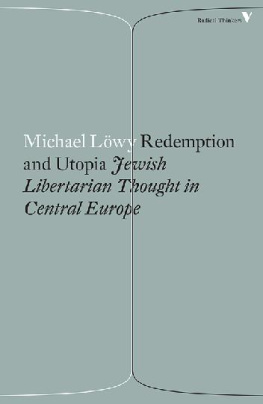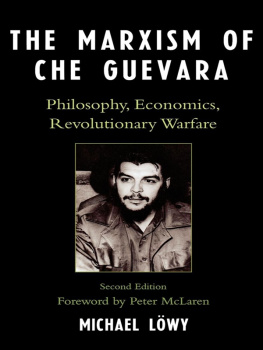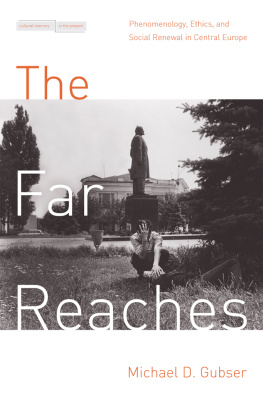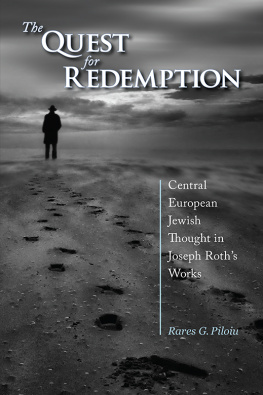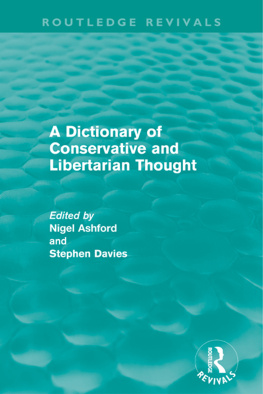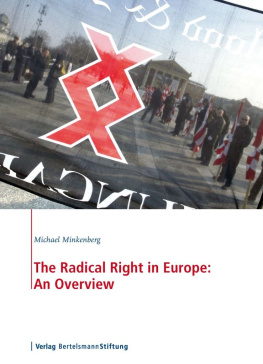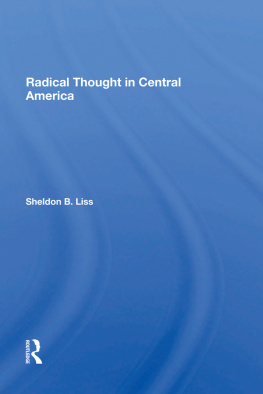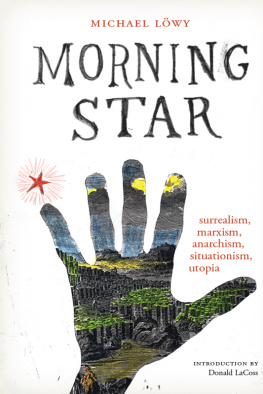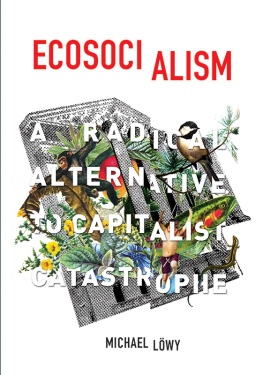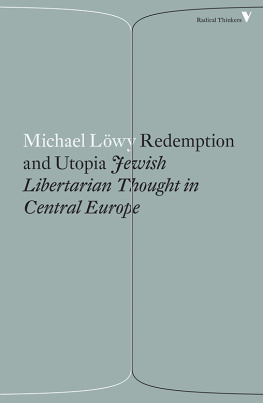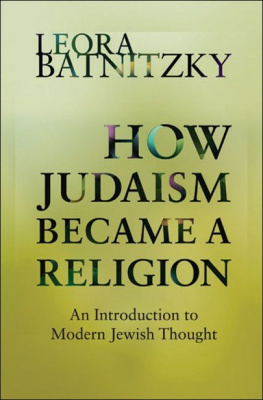Michael Löwy - Redemption and Utopia - Jewish Libertarian Thought in Central Europe (Radical Thinkers)
Here you can read online Michael Löwy - Redemption and Utopia - Jewish Libertarian Thought in Central Europe (Radical Thinkers) full text of the book (entire story) in english for free. Download pdf and epub, get meaning, cover and reviews about this ebook. City: 288, year: 2017, publisher: Verso Books, genre: Religion. Description of the work, (preface) as well as reviews are available. Best literature library LitArk.com created for fans of good reading and offers a wide selection of genres:
Romance novel
Science fiction
Adventure
Detective
Science
History
Home and family
Prose
Art
Politics
Computer
Non-fiction
Religion
Business
Children
Humor
Choose a favorite category and find really read worthwhile books. Enjoy immersion in the world of imagination, feel the emotions of the characters or learn something new for yourself, make an fascinating discovery.
- Book:Redemption and Utopia - Jewish Libertarian Thought in Central Europe (Radical Thinkers)
- Author:
- Publisher:Verso Books
- Genre:
- Year:2017
- City:288
- Rating:3 / 5
- Favourites:Add to favourites
- Your mark:
- 60
- 1
- 2
- 3
- 4
- 5
Redemption and Utopia - Jewish Libertarian Thought in Central Europe (Radical Thinkers): summary, description and annotation
We offer to read an annotation, description, summary or preface (depends on what the author of the book "Redemption and Utopia - Jewish Libertarian Thought in Central Europe (Radical Thinkers)" wrote himself). If you haven't found the necessary information about the book — write in the comments, we will try to find it.
Michael Löwy: author's other books
Who wrote Redemption and Utopia - Jewish Libertarian Thought in Central Europe (Radical Thinkers)? Find out the surname, the name of the author of the book and a list of all author's works by series.
Redemption and Utopia - Jewish Libertarian Thought in Central Europe (Radical Thinkers) — read online for free the complete book (whole text) full work
Below is the text of the book, divided by pages. System saving the place of the last page read, allows you to conveniently read the book "Redemption and Utopia - Jewish Libertarian Thought in Central Europe (Radical Thinkers)" online for free, without having to search again every time where you left off. Put a bookmark, and you can go to the page where you finished reading at any time.
Font size:
Interval:
Bookmark:
in Central Europe
AND UTOPIA
in Central Europe

This edition published by Verso 2017
English-language edition first published by The Athlone Press 1992
First published in French as Rdemption et Utopie: Le judasme libertaire en
Europe centrale
Presses Universitaires de France 1988
Translation Hope Heaney 1992, 2017
All rights reserved
The moral rights of the authors have been asserted
1 3 5 7 9 10 8 6 4 2
Verso
UK: 6 Meard Street, London W1F 0EG
US: 20 Jay Street, Suite 1010, Brooklyn, NY 11201
versobooks.com
Verso is the imprint of New Left Books
ISBN-13: 978-1-78663-085-8
ISBN-13: 978-1-78663-086-5 (UK EBK)
ISBN-13: 978-1-78663-087-2 (US EBK)
British Library Cataloguing in Publication Data
A catalogue record for this book is available from the British Library
Library of Congress Cataloging-in-Publication Data
A catalog record for this book is available from the Library of Congress
Printed in the US by Maple Press
The Defeated of History
Our generation has learnt the hard way that the only image we shall leave is that of a vanquished generation. That will be our legacy to those who follow.
Walter Benjamin
Thesis XII, from On the Philosophy of History, 1940
The term Central Europe or Mitteleuropa refers to a geographical, cultural and historical area united by German culture that of Germany and the Austro-Hungarian Empire. From the middle of the nineteenth century up to 1933, the culture of the Central European Jewish community blossomed in the most extraordinary way, experiencing a Golden Age comparable to that of the Judeo-Arab community in twelfth-century Spain. It was the product of a spiritual synthesis unique in its kind, which gave the world Heine and Marx, Freud and Kafka, Ernst Bloch and Walter Benjamin. Today this German-Jewish culture seems like a vanished world, a continent erased from history, an Atlantis engulfed by the ocean, along with its palaces, temples and monuments. It was destroyed by the Nazi tide, surviving only in scattered pockets or in exile, and its last representatives Marcuse, Fromm and Bloch have now passed away, like the final embers of a huge spiritual fire. It did, however, leave its mark on twentieth-century culture, in its richest and most innovative accomplishments in the sciences, literature and philosophy.
This book studies a generation as well as a particular current within the Jewish cultural universe of Mitteleuropa: a generation of intellectuals born during the last quarter of the nineteenth century, whose writings were inspired by both German (romantic) and Jewish (messianic) sources. Their thinking was profoundly, organically and inseparably Judeo-Germanic, whether they accepted this syncretism with pride (Gustav Landauer) or with wrenching pain (Franz Kafka), whether they tried to deny their German sources (Gershom Scholem) or their Jewish identity (Georg Lukcs). Their thinking took shape around the Jewish (cabbalistic) idea of Tikkun, a polysemic term for redemption (Erlsung), restoration, reparation, reformation and the recovery of lost harmony.
Theirs was a generation of dreamers and utopians: they aspired to a radically other world, to the kingdom of God on earth, to a kingdom of the spirit, a kingdom of freedom, a kingdom of peace. An egalitarian community, libertarian socialism, anti-authoritarian rebellion and a permanent revolution of the spirit were their ideals. Several fell like lonely soldiers in a twentieth-century Thermopylae, victims of a barbarism that was either still budding (Gustav Landauer, Munich 1919) or already triumphant (Walter Benjamin, Port-Bou 1940). For the most part, they were unarmed prophets. One episode from the life of Georg Lukcs could apply to many of them. Following the defeat of the Hungarian revolution in November 1956 (in which he had participated as Minister of Culture in the Imre Nagy government), Lukcs found himself under arrest. A Soviet officer, brandishing his machine gun, ordered: Hand over your weapons immediately! Not having any choice, the old Jewish-Hungarian philosopher took his pen from his pocket and handed it over to the forces of order.
Their generation were the defeated of history. It is not surprising that so many of them chose suicide: Tucholsky, Toller, Wolfenstein, Carl Einstein, Hasenclever, Benjamin.
In his Theses on the Philosophy of History, Walter Benjamin insisted that history be written from the point of view of the defeated. This book tries to apply that method.
Through a paradox that is more apparent than real, it is precisely because they were the defeated, because they were outsiders going against the tide of their era, and because they were obstinate romantics and incurable utopians, that, as we approach the end of the twentieth century, their work is becoming increasingly relevant and meaningful.
It goes without saying that the romantic and messianic generation contained the most diverse and contradictory political and ideological currents. The aim of this book is not to resolve its debates or to take a stand in the controversies, but rather to understand the overall movement, its genesis in Central Europe at an historical and social conjuncture of crisis and renewal for both the Jewish tradition and German culture. Written within the framework of the sociology of culture, it analyses the development of a new social category, the Jewish intelligentsia, and the conditions that favoured the dawning within that group of a twofold spiritual configuration of romantic utopia and restorative messianism. The key concept, which may open up new and still largely unexplored possibilities for the sociology of culture, is that of elective affinity a concept which appeared in the works of Goethe and Max Weber, but which I have formulated differently in this analysis. In studying the works of more than a dozen authors, both known and unknown, famous and obscure, revered and forgotten, I do not intend to sketch the history of their ideas, nor to present a short philosophical monograph on each of them; rather, I shall attempt to reconstruct an entire socially-conditioned cultural universe in its multidimensional unity. This approach seeks to throw new light on a broad expanse of modern European culture by identifying a subterranean network of correspondences linking several of the most creative intellects. I shall also try to account for the eruption, within a magnetic field polarized by libertarian romanticism and Jewish messianism, of a new concept of history, including a new perception of temporality at variance with evolutionism and the philosophy of progress.
The author who formulated this heretical concept this new mode of perceiving history and time in the deepest, most radical and subversive way was Walter Benjamin. For that reason, and because all the tensions, dilemmas and contradictions of the German-Jewish cultural universe were concentrated in his person, he takes centre stage in this essay. He is, in effect, at the heart of the messianic-romantic generation; and his thinking, though slightly out-of-date and strangely anachronistic, is also the most topical and the most charged with utopian explosiveness. His work clarifies the thinking of the others within the group; and they in turn illuminate his work, in a two-way game not of endlessly reflecting mirrors but of mutually questioning looks.
Font size:
Interval:
Bookmark:
Similar books «Redemption and Utopia - Jewish Libertarian Thought in Central Europe (Radical Thinkers)»
Look at similar books to Redemption and Utopia - Jewish Libertarian Thought in Central Europe (Radical Thinkers). We have selected literature similar in name and meaning in the hope of providing readers with more options to find new, interesting, not yet read works.
Discussion, reviews of the book Redemption and Utopia - Jewish Libertarian Thought in Central Europe (Radical Thinkers) and just readers' own opinions. Leave your comments, write what you think about the work, its meaning or the main characters. Specify what exactly you liked and what you didn't like, and why you think so.

